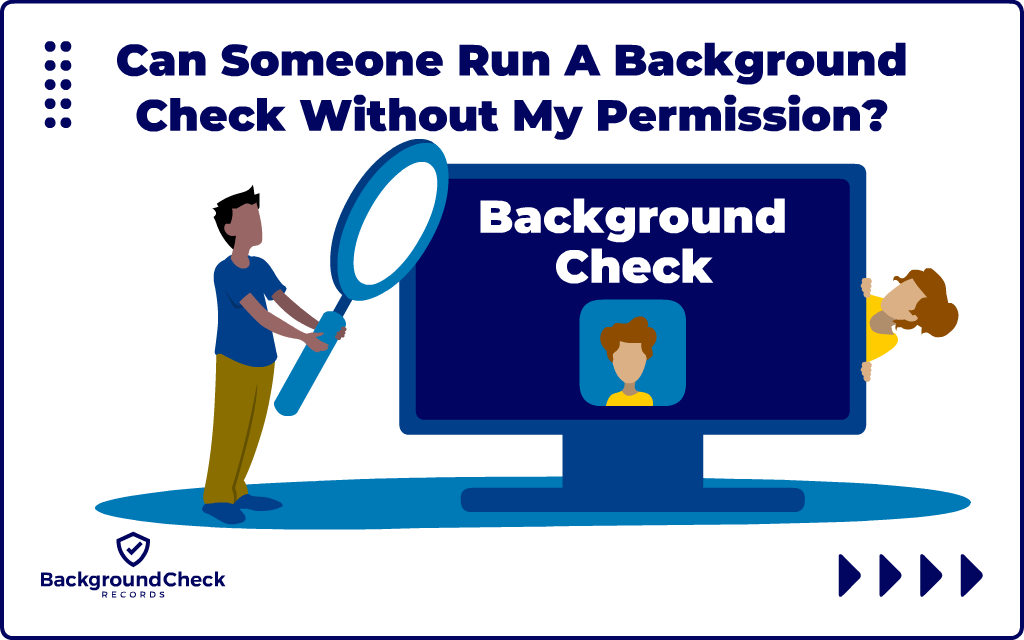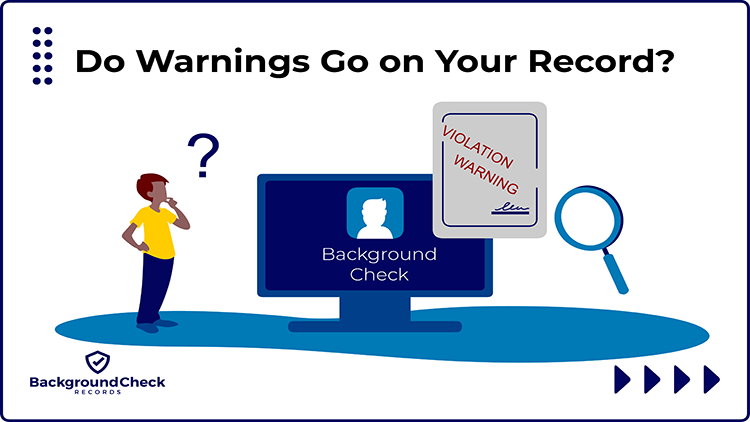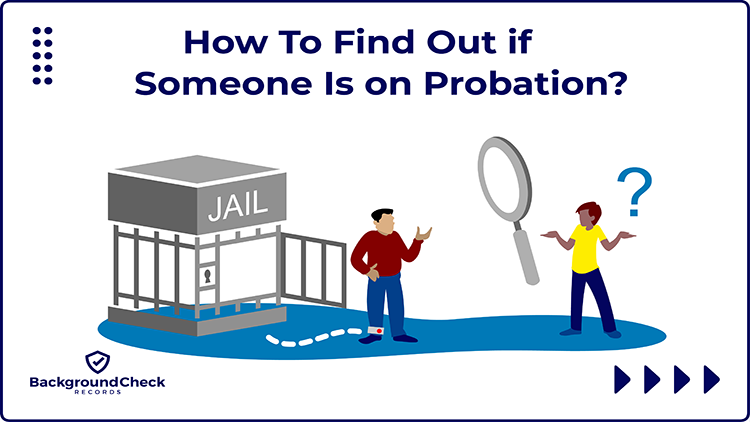Can Someone Run a Background Check Without My Permission? Legally?
When an individual is being stalked, harassed, or intimated by another person, they may worry whether someone can conduct a background check without their permission.
Additionally, when searching for a job, applying for professional licensure, or applying for an apartment, mortgage, or another type of loan, a background check is inevitable and the legalities around consent differ when a screening is done for professional purposes.
In either case, it’s important to know your rights when it comes to both personal and professional background checks, as well as what actions can be taken if the background check was performed illegally.
Is It Possible for Someone to Conduct a Background Check Without My Permission?
There are some circumstances where consent is not required by law such as personal background checks since they’re a compilation of public records. If it’s for personal reasons, you can check someone’s criminal records, their marital status, find someone’s middle name, resident’s name here, there, or anywhere using various government databases.
But for professional uses like employment, housing, licensing etc., getting permission is a necessary step before looking into someone’s past using public records. This is in part due to the Fair Credit Reporting Act (FCRA) among other federal and local statutes which we’ll get to below.
So in other words, employers and landlords must obtain written consent of the subject before running bulk background checks or any other screenings on tenants. The subject must be informed of the extent of the search and how the information will be used as discussed further below.
The subject also has the right to know to request a copy of the report, know the reason for denial, and dispute inaccuracies.
Why Is It Illegal for an Employer or Landlord To Conduct an Unauthorized Background Check Without Your Consent?
Background checks can make or break someone’s career and it’s unethical for an employer to judge someone on their public records or criminal history without the individual being aware.
Imagine if an employer ran a background check on someone, didn’t tell them, and denied their application despite the individual being well-qualified. Furthermore, transparency surrounding background checks helps to avoid criminal record discrimination.
When Consent Is Required by the Fair Credit Reporting Act (FCRA)
Background checks for commercial-related endeavors also referred to as non-personal background checks, are regulated and governed by the Fair Credit Reporting Act (FCRA) initially enacted in 1970 and enforced by the United States Federal Trade Commission (FTC).
The FTC provides guidance to consumer and professional agencies regarding background check compliance, protects the rights of citizens and has educational resources about a person’s rights.
While someone can’t perform a background check on you without consent if it’s for professional purposes, obtaining and utilizing a non-person background report is still possible in several situations per the six categories provided by the FTC:
| Category |
Type Reports |
| Court Ordered |
Per a subpoena issued by a Federal grand jury or per a court order with jurisdiction to issue the order. |
| Written Instructions |
Under certain circumstances where the subject has been given written instruction on the background check. |
| Reasonable Processing When the Subject is |
- Applying for credit/credit transaction
- Candidate for employment
- For Insurance underwriting
- Determining licensing eligibility
- Considering financial status for government benefit as required by law
- Credit assessment for a potential investor
- Otherwise legitimate business need
- Executive department/agencies in issuance of individual travel charge cards that are sponsored by the government but billed to the subject
|
| Child Support |
- Establish person’s ability to pay child support
- Establish parentage of person related to child
- To the agency administering the child support or modifying an existing child support obligation.
|
| FDIC (Federal Deposit Insurance Corporation) |
Used for purposes of appointing executor or liquidator of insured bank or credit union. |
The FTC also enforces the FCRA guidelines on when and how information under the above circumstance can be used. Written permission to conduct a background check for employment, leasing, and credit checks is not only best practice, it is a requirement per the FCRA and employees should know their rights surrounding these stipulations.
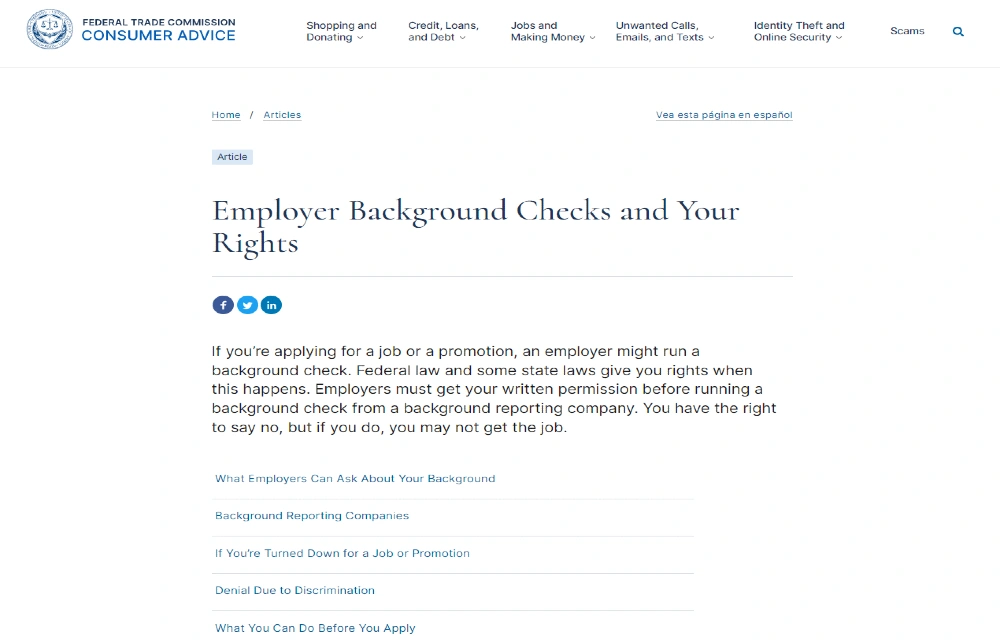
Keeping in compliance with FCRA guidelines protects the subject and the agency. Details on the types of checks will be provided later in this article.
It is not illegal for friends, family, or someone a person is dating to perform a background check without the subject’s permission since these types of reports are considered personal, not professional or commercial reports, and the rules and regulations regarding consent do not apply.
There are several third-party websites dedicated to personal background checks and these sites must inform users they are not considered consumer reporting agencies as outlined by the FCRA. When a potential employer or landlord sees this disclaimer, they know information gathered from this site cannot be used for commercial use.
Personal background checks are used for a variety of reasons, mainly to check the background of potential romantic interest, a marriage background check, or to locate family or friends a person hasn’t seen in a while, not for purposes of extended employment, easing property, obtaining a license or a gun; therefore, the same rules do not apply.
Ultimately, personal information found on personal background checks comes from public records, which are accessible to anyone – so permission is not required.
Is it Possible To Run a Background Check on Someone Without Them Knowing?
If the background check is going to be conducted by a potential employer, landlord, or other consumer agency, it is illegal and unethical to run a check without the party’s consent and knowledge.
Information gathered in a non-personal background check must be disclosed to the subject and any action taken based on that information must also be provided to the subject, and all disclosure must be made in writing.1
On the other hand, personal background checks are run without the subject’s knowledge, and searchers must certify they are not using the information for the purpose of extending credit, leasing property, or making a determination for employment with the third-party company that provides the information.
Types of Background Checks That Require Someone’s Explicit Consent
There are several different types of background checks. The information returned depends on the type the searcher conducts.
| Type Check |
How it is Used and/or Information included |
Consent Requirement |
Additional Information |
| Level 1 Check (Personal Background Check) |
Typically a name-only check |
Consent is only required when the background check is being obtained for non-personal reasons (such as employment offer, extending credit, or for tenant screening). |
Anyone can conduct this type check. Florida is the only state that has specific language in its statutes breaking down background checks by level for non-personal use.2 |
| Level 2 Check |
More extensive than a name-only search. Can include other personally identifying information (PII) such as social security number, date of birth, address, or other information. This sometimes includes fingerprint searches for local, state or federal law enforcement records. |
Consent of the subject is required to conduct a level 2 search. |
Florida is the only state that has specific language in its statutes breaking down background checks by level for non-personal use. |
| Employment Purposes |
Employers must comply will all laws regarding preventing discrimination as outlined by the Equal Employment Opportunity Commission. |
Subjects have to consent to a background check in writing. Use of an investigative report (interviews with persons regarding the general character of the subject) must be disclosed to the applicant including the extent/nature of the interviews. |
Applicants must be informed in writing if a background check will be conducted and how the information will be used to determine employment eligibility. When using a third-party agency to conduct the check, provide documentation of subject’s consent, agency compliance with FCRA requirements, and certification information will not be used to discriminate against applicants. |
| Tenant Screening |
Landlords must have a permissible purpose for running a background check (such as receipt of an application for a rental property).
Reports can include criminal history, credit report and rental history. |
Obtaining written consent can establish this permissible purpose. Subjects must be provided information on the FCRA and the rights of subjects must be honored. |
Must certify to the third party running the check that it will only be used for housing purposes. When adverse action is taken, the subject must be notified either orally, in writing, or via electronic means (email/text).Once the purpose of the report has been satisfied it must be immediately destroyed. |
In addition, there is a level 3 and level 4 background check on top of a few others, but the only background check that does not require consent or permission is a personal background check.
What Can You Do if Someone Runs a Background Check on You Without Consent or Permission?
Anyone can run a personal background check without your permission if it’s used for personal purposes and there isn’t much you can do about it unless the person use the information to stalk, harass, or initiate you. In these cases, it’s best to contact law enforcement immediately to document the matter through a police report and potentially request a restraining order.
Luckily, some states require the requester to identify themselves and state the reason for the screening but on the flipside, background checks can still be done through third-party providers without a reason and without identification.
However, employers, landlords, licensing boards, and others who illegally conduct background checks for commercial reasons can be reported to the Federal Trade Commission (FTC) using the FTC Fraud portal — more information on this can be seen below.
How To Take Action If a Professional Background Check is Ran Without Permission (Report It To The FTC & EEOC)
There are two main agencies that deal with background check fraud and the following links provide details on their governance regarding background checks:
If an employer, landlord, or agency is using a background check as part of the screening process, they must adhere to the rules and regulations outlined in the FCRA. When someone learns an unauthorized background check has been conducted, they have the option to file a formal complaint as outlined below.
When employers or landlords obtain a background check without the consent of the subject, the subject can report the violation to the FTC. Additionally, if the subject is denied the position or rental property and is not provided with the required notices, the subject can make a report using the FTC Fraud portal.3
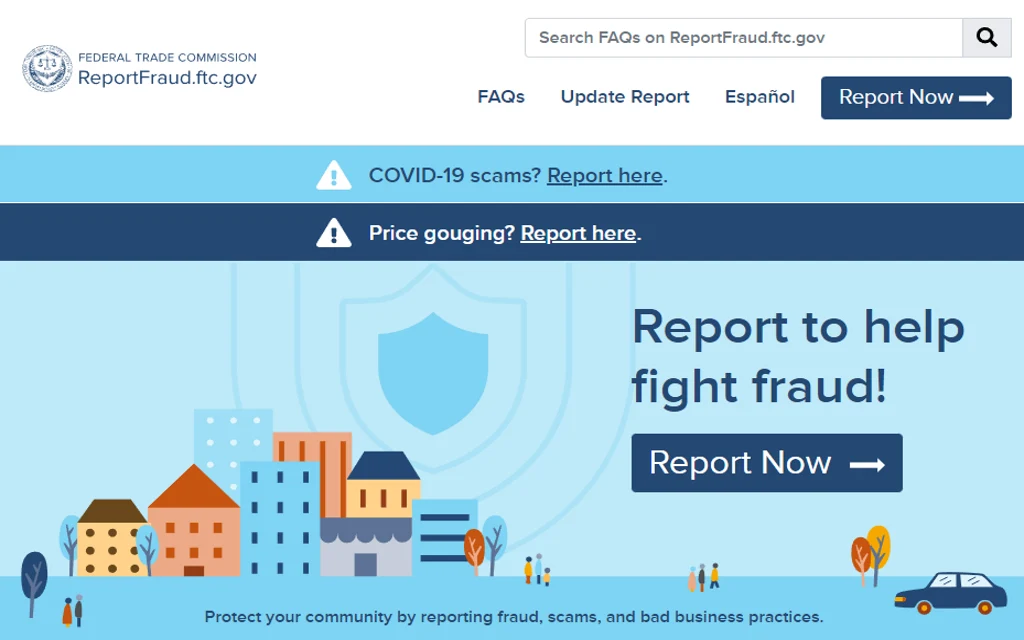
When a candidate is unlawfully denied employment due to a background check or denied a rental based on discrimination (for example, background checks are used to eliminate candidates with certain criminal convictions that significantly negatively impact a protected class) a report can be made to the US EEOC by calling 1-800-669-4000 or 1-800-669-6820 (TTY). Discrimination reports can also be made online at Equal Employment Opportunity Commisison.4
Candidates who feel they have been unfairly or illegally treated due to a background check, or discover an unlawful background check was conducted, can also hire a private attorney specializing in employment law to seek relief.
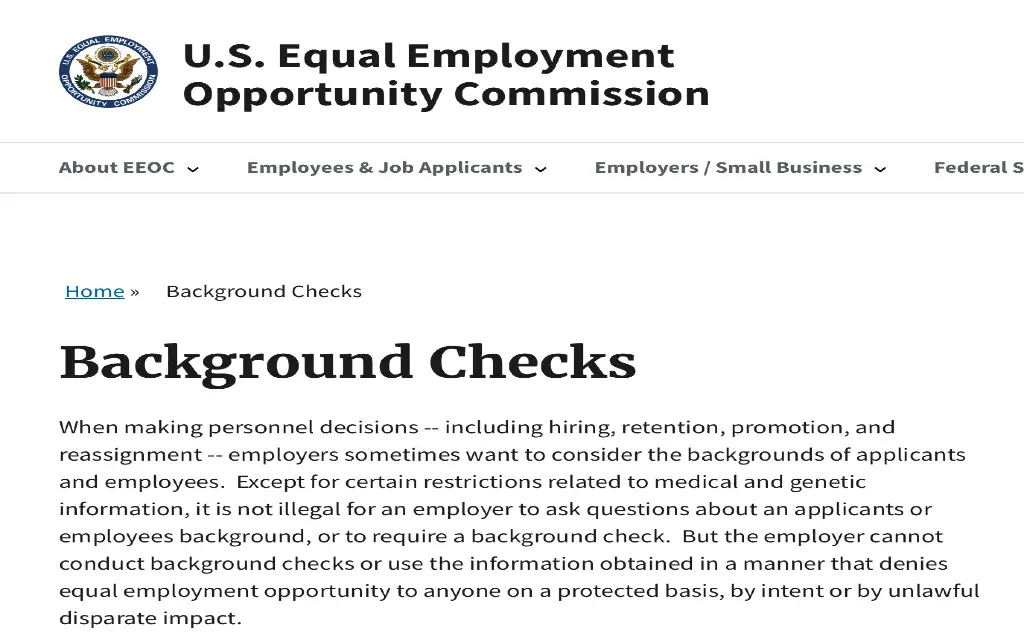
Running background checks may be a common occurrence in today’s world, but there are rules enforced by the FTC that outlines the information gathered, who can access data, and how that data is used.
Therefore, someone can not run a background check without your permission if it’s for professional purposes and you can report an illegally run background check to the FTC; yet, personal background checks can be done without your consent and if the information is used to harass, intimidate, or harass you, it’s best to report it to a local law enforcement agency immediately.
Frequently Asked Questions
Are Employers Allowed to Run Background Checks After the Initial Hiring Process?
Background checks do not start and end with pre-employment screenings. An employer can conduct background checks on individuals currently employed; however, those screenings must comply with the same rules and regulations as pre-employment screenings. Written consent is given in the pre-employment stage and usually has language that covers post-employment screenings. This limits the employer to the same pre-employment screenings post-hire unless updated written consent is obtained.
Do Police Have the Ability to Run a Background Check on Anyone?
Police have access to databases that contain motor vehicle registration and driver’s licensing, outstanding local warrants, national warrants listed in the National Crime Information Center, and public search databases. This gives them the tools they need to get information quickly when encountering a suspect; however, police do not have blanket permission to run checks whenever they wish. Police officers who run unauthorized checks can be charged with police misconduct for violating the public trust.
1 Fair Credit Reporting Act – Revised September 2018. (n.d.). Federal Trade Commission. Retrieved July 4, 2022, from <https://www.ftc.gov/system/files/documents/statutes/fair-credit-reporting-act/545a_fair-credit-reporting-act-0918.pdf>
2 Statutes & Constitution :View Statutes. (n.d.). Statutes & Constitution :View Statutes : Online Sunshine. Retrieved July 4, 2022, from <http://www.leg.state.fl.us/statutes/index.cfm?App_mode=Display_Statute&Search_String=&URL=0400-0499/0435/Sections/0435.03.html>
3 Reporting Fraud to the FTC. (n.d.). ReportFraud.ftc.gov. Retrieved July 4, 2022, from <https://reportfraud.ftc.gov/#/>
4 Filing A Charge of Discrimination. (n.d.). US Equal Employment Opportunity Commission. Retrieved July 4, 2022, from <https://www.eeoc.gov/filing-charge-discrimination>

